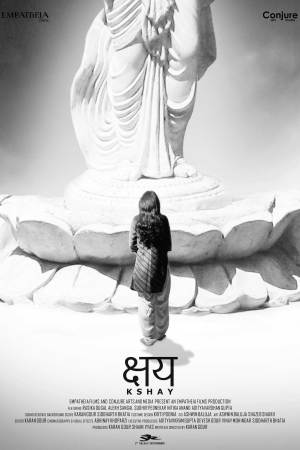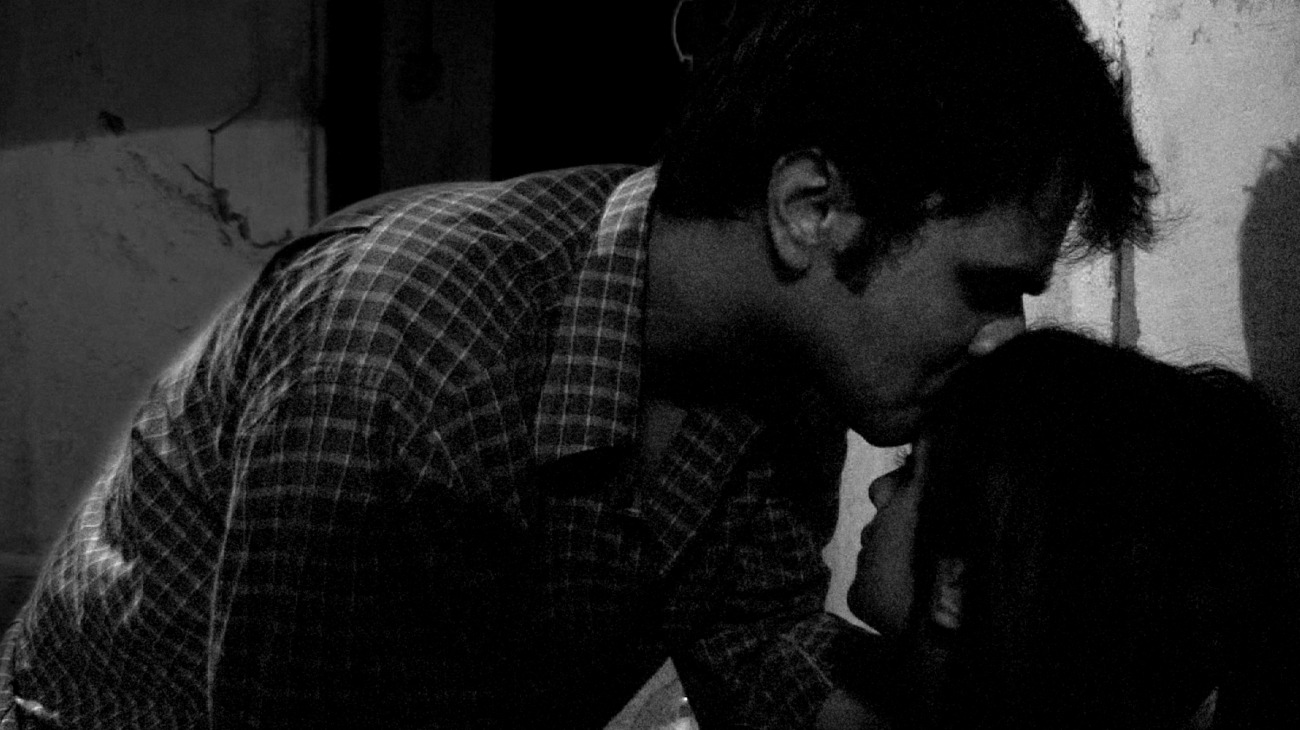
The 47th Chicago International Film Festival
Screens at CIFF: 10/8 & 10/9 & 10/11
WORLD PREMIERE
I'm in no position to make pronouncements about Indian cinema, so I'll defer to the experts: and they inform me that right now, that country is on the cusp of a New Wave, in which the traditional Bollywood entertainments that maybe you and certainly I think of when you call to mind Indian films (three hours long, musical numbers in everything from historical epics to police procedurals) are eschewed in favor of smaller, more direct stories of the workaday life lived by hundreds of millions of non-singing-and-dancing Indians. This rather makes sense, when you think about it, for the same reason that the French New Wave happened back in '59 and gave its name to pretty much every similar New Wave since then: it's all well and good for a national cinema to focus on luscious, exorbitant spectacle, but sometimes a bright young filmmaker just wants to tell a damn story about damn people.
With that bit of scene-setting out of the way, we can turn to one of those very same Indian New Wave pictures: Corrode, the debut feature of writer, director, producer, editor, composer, & sound mixer Karan Gour. The fact that he was called upon to perform so many tasks in the production of a single motion picture tells us one of the most important things we need to know about his film, because generally when a director starts stacking on hyphenates beyond more than, say, three, we are almost certainly in the territory of microbudget indies (at least, we would if this were an American picture and Gour was an unemployed guitarist living in New York), and that calls for a certain relaxation - not grading on a curve, that's just insulting to everybody involved, but certainly it permits a kind of accommodation, and when I observe that, for example, Corrode was shot in locations that look uncomfortably vacant even before the script calls upon them to be so, what we're probably seeing is not sloppy filmmaking but impoverished filmmaking that couldn't afford to pitch too much money at production design.
Put it another way still: Corrode has its share of problems, but I look forward to seeing what Gour can do when he's got some real money to play with.
On to thing itself: Corrode is about an amateur graphic artist, Chhaya (Rasika Dugal), living as a member of what would, in New York, be called the "creative class": she and her husband Arvind (Alekh Sangal) live paycheck-to-paycheck, but they don't live poorly, and they're both bright and ambitious enough to have a good idea of where their future is taking them. When we first meet them, they're both at a turning point: Arvind is meeting with legitimate businessman Bapu (Sudhir Pednekar) about overseeing a new construction job, while Chhaya, on a walk through the city, wanders into the studio of an irritated sculptor (Adityavardhan Gupta), and falls in love on the spot with his barely-finished statue of the goddess Lakshmi (I'm familiar enough with Hinduism to know that it's not easy to map Hindu deities onto concepts like Greco-Roman gods, but in crude terms, Lakshmi is the goddess of fertility). The life-sized statue costs a hefty Rs. 15,000 and is thus miles out of reach of the cash-strapped couple, but Chhaya begins to obsess over finding a way to own it, by any means necessary, and over the course of the film's tight 92 minutes is driven to literal, honest-to-god insanity over it.
As you'd expect from a film with a title like Corrode, the bulk of the movie watching how Chhaya's obsession rots her life out from the inside: there's a healthy bit of Repulsion (a stated influence) and even some Eraserhead-style organic horror in the way that the film demonstrates her breakdown in physical terms, mirroring her mind with her apartment and her extremely tactile hallucinations. It's effective, anyway, even if it's not tremendously original; certainly, Gour and cinematographer Abhinay Khoparzi use their abnormally wide aspect ratio (2.55:1, the Cinerama shape) and some gorgeously hazy digital black-and-white to fantastic effect in turning their heroine's plight into visual language.
The downside is that Chhaya and Arvind aren't entirely strong enough characters to support a psychodrama: midway through, when we start to learn the details of her life that explain, or at least purport to, why she has gone so far beyond the bend on this Lakshmi business, it tastes a little bit like a screenwriter throwing in a motivation that doesn't not make sense, just to keep things moving along. Honestly, parts of the movie almost break down in to a reductive "Well, women. Too high-strung. Of course they're going to snap" sort of argument, and that doesn't do anybody a terrible lot of good. Add in the shocking and frankly mean-spirited ending, and we're left with a movie that works very well at creating a mood - startlingly so, for a newbie director - and fumbles around a bit as a narrative.
Yet Dugal and Sangal both give perfectly satisfying performances, and the film certainly goes for the throat, with all its queasy-making touches of body horror and psychosis (some of Chhaya's drawings frankly gave me the heebie-jeebies). It's effective and extremely grabby, and if this is what the Indian New Wave looks like, I should absolutely think we could do with some more of it in the West.
7/10
WORLD PREMIERE
I'm in no position to make pronouncements about Indian cinema, so I'll defer to the experts: and they inform me that right now, that country is on the cusp of a New Wave, in which the traditional Bollywood entertainments that maybe you and certainly I think of when you call to mind Indian films (three hours long, musical numbers in everything from historical epics to police procedurals) are eschewed in favor of smaller, more direct stories of the workaday life lived by hundreds of millions of non-singing-and-dancing Indians. This rather makes sense, when you think about it, for the same reason that the French New Wave happened back in '59 and gave its name to pretty much every similar New Wave since then: it's all well and good for a national cinema to focus on luscious, exorbitant spectacle, but sometimes a bright young filmmaker just wants to tell a damn story about damn people.
With that bit of scene-setting out of the way, we can turn to one of those very same Indian New Wave pictures: Corrode, the debut feature of writer, director, producer, editor, composer, & sound mixer Karan Gour. The fact that he was called upon to perform so many tasks in the production of a single motion picture tells us one of the most important things we need to know about his film, because generally when a director starts stacking on hyphenates beyond more than, say, three, we are almost certainly in the territory of microbudget indies (at least, we would if this were an American picture and Gour was an unemployed guitarist living in New York), and that calls for a certain relaxation - not grading on a curve, that's just insulting to everybody involved, but certainly it permits a kind of accommodation, and when I observe that, for example, Corrode was shot in locations that look uncomfortably vacant even before the script calls upon them to be so, what we're probably seeing is not sloppy filmmaking but impoverished filmmaking that couldn't afford to pitch too much money at production design.
Put it another way still: Corrode has its share of problems, but I look forward to seeing what Gour can do when he's got some real money to play with.
On to thing itself: Corrode is about an amateur graphic artist, Chhaya (Rasika Dugal), living as a member of what would, in New York, be called the "creative class": she and her husband Arvind (Alekh Sangal) live paycheck-to-paycheck, but they don't live poorly, and they're both bright and ambitious enough to have a good idea of where their future is taking them. When we first meet them, they're both at a turning point: Arvind is meeting with legitimate businessman Bapu (Sudhir Pednekar) about overseeing a new construction job, while Chhaya, on a walk through the city, wanders into the studio of an irritated sculptor (Adityavardhan Gupta), and falls in love on the spot with his barely-finished statue of the goddess Lakshmi (I'm familiar enough with Hinduism to know that it's not easy to map Hindu deities onto concepts like Greco-Roman gods, but in crude terms, Lakshmi is the goddess of fertility). The life-sized statue costs a hefty Rs. 15,000 and is thus miles out of reach of the cash-strapped couple, but Chhaya begins to obsess over finding a way to own it, by any means necessary, and over the course of the film's tight 92 minutes is driven to literal, honest-to-god insanity over it.
As you'd expect from a film with a title like Corrode, the bulk of the movie watching how Chhaya's obsession rots her life out from the inside: there's a healthy bit of Repulsion (a stated influence) and even some Eraserhead-style organic horror in the way that the film demonstrates her breakdown in physical terms, mirroring her mind with her apartment and her extremely tactile hallucinations. It's effective, anyway, even if it's not tremendously original; certainly, Gour and cinematographer Abhinay Khoparzi use their abnormally wide aspect ratio (2.55:1, the Cinerama shape) and some gorgeously hazy digital black-and-white to fantastic effect in turning their heroine's plight into visual language.
The downside is that Chhaya and Arvind aren't entirely strong enough characters to support a psychodrama: midway through, when we start to learn the details of her life that explain, or at least purport to, why she has gone so far beyond the bend on this Lakshmi business, it tastes a little bit like a screenwriter throwing in a motivation that doesn't not make sense, just to keep things moving along. Honestly, parts of the movie almost break down in to a reductive "Well, women. Too high-strung. Of course they're going to snap" sort of argument, and that doesn't do anybody a terrible lot of good. Add in the shocking and frankly mean-spirited ending, and we're left with a movie that works very well at creating a mood - startlingly so, for a newbie director - and fumbles around a bit as a narrative.
Yet Dugal and Sangal both give perfectly satisfying performances, and the film certainly goes for the throat, with all its queasy-making touches of body horror and psychosis (some of Chhaya's drawings frankly gave me the heebie-jeebies). It's effective and extremely grabby, and if this is what the Indian New Wave looks like, I should absolutely think we could do with some more of it in the West.
7/10






